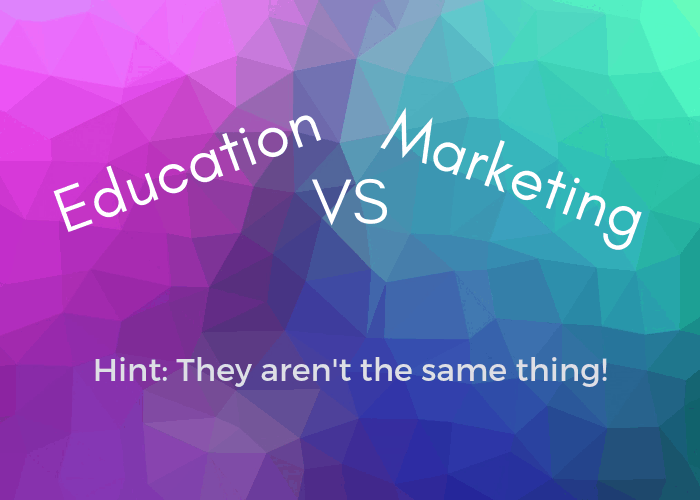
Education VS Marketing
Education is all over the nonprofit and public sectors but is it the same as marketing. For example:
- Land trusts that include educational efforts in their community conservation work
- Public health agencies that have chronic disease prevention education programs
- Issue groups that seek to educate lawmakers or voters
- Environmental education groups that work to increase awareness about climate change
That’s a lot of organizations, staff, board members, and volunteers who care passionately about education! So, why is it so hard to define metrics of success? Why is it so hard to calculate the return on investment of so many of these educational efforts?
Education is a Catch-All
I think it’s because we all have a bad habit of using education to mean too many different things. Just look at that list again. You could substitute the word education with many others—advocacy, program, outreach, awareness, etc.—and still mean the same thing.
Most of the time when an organization says education they really mean, “If more people understood our issue or knew about our work, they would behave the way we want them to (conserve water, give us money, eat their fruits and vegetables, etc.)”.
Guess what. That’s not education. That’s marketing.
Education and Marketing are Different
The purpose of education is to increase knowledge, skills, or abilities. And the results of education are easy to measure. Those educated either know something they didn’t know before or can do something they couldn’t do before, or they can’t.
On the other hand, marketing is about understanding an audience in order to be able to encourage them to take action on your behalf. The principles and practices of marketing tell us that it is necessary to fully understand other people’s behaviors, attitudes, values, and lifestyles before you can make your cause relevant to them (or address barriers to or increase incentives for behavior change i.e., social marketing).
When Education is the Wrong Tool
That’s a key difference. As an educator, your primary job is to teach. As a marketer, your primary job is to listen. Consider this. If your goal is for people to change their behavior in some way and you opt for an education strategy, you are assuming that people lack the right knowledge or skills. What if that’s the wrong assumption?
A few years ago, we completed a public health project in Louisiana with an agency that wanted to increase the number of new mothers who breastfeed. After a lot of time on the ground listening, we learned that most of the expectant mom already knew the benefits of breastfeeding, wanted to try it, and knew where to turn if they had questions once the time came. We also learned that some large hospitals had policies of not releasing a mom and baby until the baby had been bottle-fed. No amount of educating expectant mothers was going to change hospital policy. But a marketing strategy aimed at decision makers? That could make a real difference.
Education and marketing are different functions based on different disciplines and principles. Understand the difference and your organization will not only be able to choose the right strategy — you will also be able to measure success!

